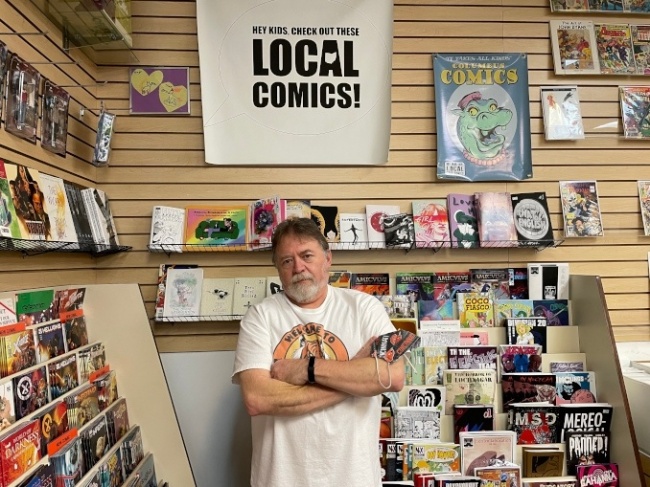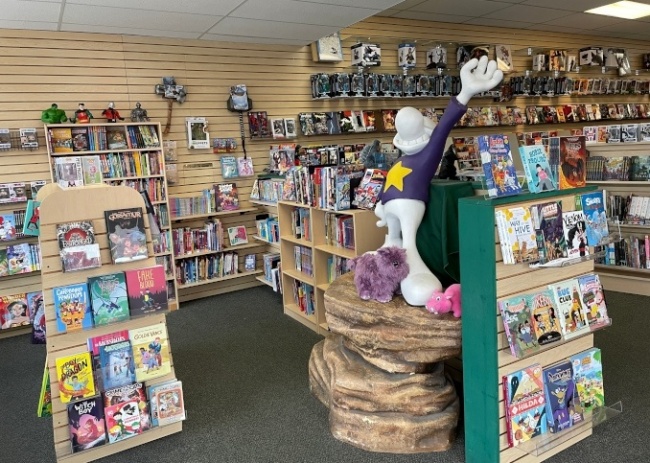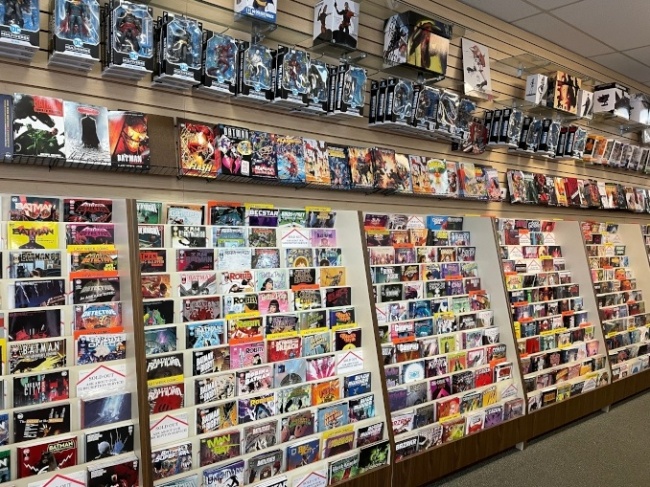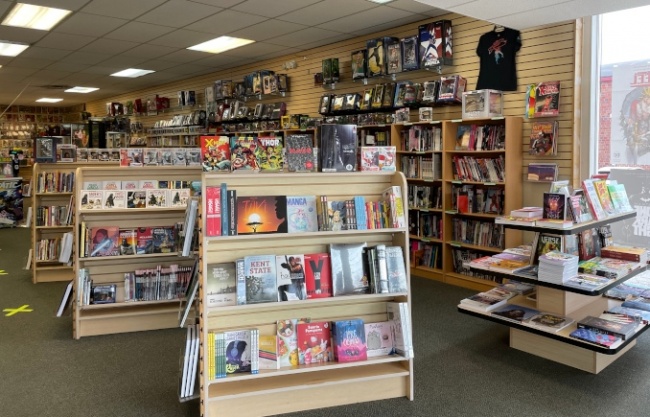In Business 3×3, a business retailer or executive will share their experience with three things they’ve done right, three things they’ve done wrong, and what else they’ve learned along the way. In this month’s installment, Gib Bickel share his 20+ years of experience and an important lesson on the importance of management training.
What prepared Gib Bickel for a career in comic retail? Twelve years running a Wendy’s in Columbus, Ohio.
You might not see the parallels between slinging burgers and slinging Batman, but Bickel assures you, there are lessons to be learned.
“A Wendy’s manager is graded on a weekly P&L statement,” Bickel says today. “Every Monday morning when you do that P&L… you learn infinitely valuable lessons. You start thinking about everything in the P&L. What size Dumpster do I have? Is it too big, and can I get by with a littler one cheaper? What’s the shipping cost on items? All of that is infinitely valuable to know when you’re running a business.”
The lessons add up, just as the dollars add up.
“Our store almost hit a million dollars,” Bickel says. “So you’re running a Wendy’s? You’re running a million-dollar business.”
But in time, Bickel teamed up with a couple other Wendy’s employees, Rod Phillips and Darren Gearino, for a venture of their own.
“We formed a friendship, and eventually a partnership. And we opened The Laughing Ogre because basically there weren’t any comic stores that we loved like we loved a previous store that had gone out of business, the Wizard of Comics.”
And so the Ogre opened in Columbus in 1994. The timing, as Peak Comics was starting to crash, seemed inopportune. But Bickel takes a contrary view.
“Yes, at the time, if we would have known and really looked around, we would have seen that all the forces of the business were pointing down,” he says. “But we had an enthusiasm that had been choked out of most people who had just ben through tough times. We opened up, and we were just happy to be selling comics rather than selling burgers.”
Bickel and his partners sold The Laughing Ogre in 2006, and the store was sold again in 2010 to new owner Chris Lloyd. Bickel now manages the store, bolstered by decades of knowledge…
THE GOOD
BE THE BE-ALL, END-ALL
Enthusiasm? Yeah! The initial concept of The Laughing Ogre was to create a store that was catch-all enough that you’d never have to go anywhere else.
“We looked at everyone’s hours, and we opened an hour longer,” Bickel says. “We looked at other people’s depth of material and said we’ll carry more.”
The extra hustle and the extra depth of stock paid off.
“It led to a lot of good things,” Bickel says. “Opening an hour earlier made it easier for certain customers to make it in. More material made it so that we could hook a reader into a new book, and keep them as regular, ongoing customers.”
EMBRACE ALL AGES
It took Bickel a while to come around, but 2006 Ogre owner Gary Dills showed him the light on catering to kids.
“One of the things that Gary did was put in an all-ages section,” Bickel says. “We never had a lot of kids come in, but it was a brilliant idea and it has paid off big-time over the years.”
Like most stores that go heavy on all-ages, the Ogre’s kids section is right up front as you walk in. And the impact is felt.
“Everyone needs to see it, because one of the things that I think is essential is that we need to indoctrinate kids early into graphic literature,” Bickel says. “My wife reads voraciously, but she does not feel the flow of a comic book like she does a prose novel. It’s an alien language to her because she wasn’t indoctrinated into it. Get kids to read comics early.”
GO BROAD SWATH
Depth of material has always been a Laughing Ogre staple, and it helped put them on the map back in the day.
“In 1994, there were a lot of stores that specialized in superhero comics, and that was about it,” Bickel says. “But one of the things that broke us out was Stray Bullets. When people came in, I’d say, ‘Have you read this?’ Most people hadn’t even seen it. I told them it was wonderful stuff, as close to reading a Quentin Tarantino comic as you could get. People would waver: It was black-and-white, it was a crime comic. But I’d tell them, ‘Try it. If you don’t like it, bring it back next week; I’ll swap it for something else.’”
Customers rarely swapped it out.
“I think we sold 3% of the first print run of Stray Bullets #1 all by ourselves because we kept reordering it,” Bickel says. “And it was one of the things that broke us out. It became, ‘I go to the Ogre because they get different stuff into my hands, and good stuff.’”
Bickel was an early adopter as well on Strangers in Paradise, Bone, and Usagi Yojimbo, all now comic staples.
“That wide net you cast,” he says, “a wide variety of material is important to getting a wide variety of readers.”
THE BAD
BEWARE DISCOUNTING
In the early days when Bickel was “looking at everyone else,” he decided to price-match the competition. That can be a double-edge sword, and the Ogre got cut when it came to matching the new comic discount of their competitors at 20%.
“It was an enormously bad call,” Bickel says. “You’re taking your most essential sales, your most regular sales, and the sales you put the most time in on with your pull-and-holds, and you’re almost making them a liability at 20% off.”
Bickel knows many stores do regular and deep discounting. He’s just not too crazy about it.
“People look at it like, ‘20%? That’s just blah-blah-blah if I’m making 55, 57%,’” he says. “But the way I look at it is if you’re not making a 20% profit at the end of the year, then you’re losing money on those books.”
The irony? Under current ownership, The Laughing Ogre is discounting new comics again. Bickel hopes the store gives them more than just a percentage off.
“When I owned the store, we got rid of the discount completely,” he says. “We did lose customers, there’s no doubt. But the customers we lost, we lost to big online discounters. I think we would have lost then eventually anyway. The customers who stayed… most thought in terms of what they get, the community feel, the customer service, the friendliness. It’s worth it to them.”
DON’T OVERBUY
Sure, some books really pop and you might be caught short. But overall, Bickel makes caution his watchword when it comes to ordering.
“As much as you hear the hype, and the most recent one is Superman: Son of Kal-El and ‘Oh, everyone’s calling us about this,’ in the long run, it’s better to sell out than to have 50 copies sitting in the back,” he says.
Bickel learned from hard experience… that he takes the blame for.
“One of the biggest reasons we sold the store in ’06… I’m the pie-in-the-sky guy,” he says. “I think I can sell anything. And sometimes, it’s true, Stray Bullets! But when the pie-in-the-sky guy was doing all the ordering… it was great learning experience. When we sold the store, we had so much dead stuff in the back room. My fault.”
NEVER STOP REACHING OUT
Laurels are good. Resting on your laurels? Not so much. The Laughing Ogre climbed the ladder… then forgot what got them there.
“For the first few years, we were everyone’s second-favorite store,” Bickel says. “Then by year 4 or 5, we became the big store in town. We had great growth for five straight years, and we were everywhere. Every time there was a comic show in town, we were there. Every opportunity, promote the store.”
Bickel and crew were working crazy hours, but when they became the big boy, they stopped reaching out. The result was a bit of leveling, which Bickel has learned from.
“I don’t know that it’s necessary to do every last comic show, but since I’ve been back, we do a lot of community stuff,” he says. “Libraries, yes, go! The big thing is to go where people aren’t comic fans. We stopped doing that for a while. We took it for granted. We weren’t trying to actively promote awareness of comics, and you can’t lose sight of that. We got a little jaded; a little big-headed.”
AND WHAT ELSE?
“That’s the case with so many comic stores. People open a store because their store closed.”
“Wendy’s did a great job training their managers on business principles. We’d do these training classes on all kinds of things. We complained about having to do these every time, but now… I realize some of the things I’ve known and built on for 20 years are because Wendy’s taught me.
“A new comic store… it’s hard to break through, because a lot of people are like, ‘New store? Oh, no, this is where I have my pull list.’ For our first three years, we were everybody’s second-favorite comic store.”
“People ask me if I’m a Marvel guy or a DC guy. I’m like, ‘What? That’s like asking me if I like Houghton Mifflin books or Penguin.’ I follow creators.”
“We’re five miles from Ohio State University. There are a lot of readers in this neighborhood. We carry a wide variety of material. We love black-and-white comics. We love crime comics, superhero comics, whatever.”
“Jeff Smith is from Columbus. He called a store right across the street from Ohio State University, I mean right across from the main campus. He told them back in the day that he had this new book coming out, Bone, and he wanted to come there and sign copies. The store just didn’t have the time, whatever. That store’s not there anymore.”
“The Walking Dead. When it first came out, I was in love with it. But people were like, ‘black-and-white zombie comics? Come on.’ Now people say, ‘You forced me to read The Walking Dead. Now I just sold #1 for $400. Thanks!’”
“Vault Comics has a trade paperback called Heathen. We’ve sold 200 copies of that paperback. Other stores don’t even carry it. But it’s phenomenal, it’s great.”
“You’d think things are easier now because of the movies. But there are still people who don’t know there are comics connected to them. I‘ve been here since ’94, and I get new people walking through the door saying, ‘You know, I’ve been driving by this place for years, but I never knew what you were all about.’”
“I think it’s amazing how freely people in this business will offer information, help you out, especially if you’re a new store. It’s a wonderful thing to see.”
“I understand how a lot of retailers want to get out of the online retailer forums, or at least limit their exposure, because of the negative energy that can be there. A lot of our staff is like that. With 3000 small businesses, it’s pretty much impossible for all of them to be professional. But I look at it all. I don’t interact, but I see everything. Signal-to-noise can be tough to wade through, but if you can tolerate it, there’s a lot of information there to be had. If you have a problem, chances are there’s already a thread about it there, and that’s information; that’s power.”
“There’s always a chance to collaborate, too. One year for Free Comic Book Day, four or five of the stores here in Columbus pooled resources and took out an ad in the local newspaper, promoting the event, listing all our stores. And our customers loved it. They said, ‘I love to see you guys working together. ’Cause you know what? I come here, but I also go there for gaming, or there for this or that or another thing. It’s nice to see you working together.’ This business always gives you great opportunities to find comrades.”
Click Gallery below for store pics!
Source: ICV2








